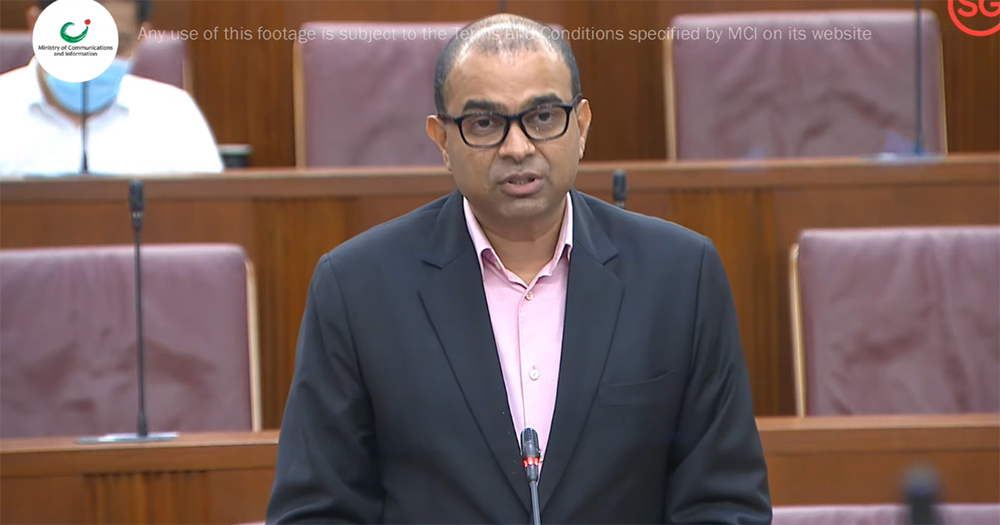Follow us on Telegram for the latest updates: https://t.me/mothershipsg
There are around 300 officers from the Immigration and Checkpoints Authority (ICA) and the Ministry of Health (MOH) who handle an average of 6,700 daily queries pertaining to quarantine and testing matters.
This was revealed by Senior Minister of State for Health Janil Puthucheary in Parliament on Oct, 4.
He was responding to multiple questions from several MPs about feedback over the administration of quarantine orders (QOs) and stay-home notices (SHNs), the response to public queries, and the capacity of healthcare facilities in coping with the spike in Covid-19 cases, among other matters.
Janil: We seek the public's understanding for longer response timings during this period
Puthucheary added that while such queries should be resolved within three working days, the current surge in cases had resulted in some of these cases, particularly the complex ones, taking longer to resolve.
In turn, this has led to an increase in the waiting time for others before their calls can be connected, even if their queries are not as complex, he said.
In calling for the public's understanding over the longer response timings, Puthucheary said that resources were being enhanced to manage the surge, with additional public communications material on Covid-19 being put up in the media and on MOH's website for the public to help themselves along with their families and friends.
When asked a follow-up question about communicating the risk of Covid-19 to the public relative to other diseases such as influenza and dengue, Janil replied that while there is a need to communicate the risk of Covid-19 and put it into context against other diseases, such as influenza, it will only be done once Singapore has reached "some sort of equilibrium."
Such an equilibrium, he elaborated, has not yet been achieved as Singapore is in the middle of a large wave and there "are very real anxieties" about Covid-19, particularly for the elderly and under-vaccinated, which should not be underplayed.
Home recovery programme to be scaled up
Janil then brought up his next point that the home recovery programme would be scaled up so as to ensure hospital and medical resources are prioritised for severe Covid-19 cases.
He noted that currently, over 98 per cent of people infected with Covid-19 had mild or no symptoms, with only 0.3 per cent needing intensive care, or had passed on.
The minister said, "This is a result of having vaccinated most of our population, who will only experience a mild illness if they suffer a breakthrough infection."
He added, "Thus we are making home recovery the default protocol for infected individuals, unless they have severe symptoms, are elderly or have underlying co-morbidities that make them more susceptible to severe disease outcomes."
Healthcare resources will be prioritised to focus on the vulnerable
With regard to healthcare resources, Puthucheary highlighted that currently, about 15 per cent of hospital beds in the public hospitals are used for around 10 per cent of all Covid-19 cases.
As for those requiring oxygen support or ICU care, these account for 2 per cent of the total cases, mostly the unvaccinated or the elderly.
In addition, the ICU bed occupancy has increased from 26 per cent to 53 per cent in the past three months while the occupancy of isolation beds has risen from 58 per cent to 86 six per cent, and the occupancy of community care facilities has increased from 10 per cent to 35 per cent.
Meanwhile, public hospital emergency departments have seen up to an eight-fold increase in the number of patients who have positive results using ART or PCR tests.
Government is monitoring manpower situation, as healthcare workers have tested positive
The government is also monitoring the manpower situation given that close to 400 healthcare workers have tested positive for Covid-19.
Puthucheary added:
"Prior to the last 14 days, we conveyed Covid-19 patients above 70 years old to the hospital within 12 hours, from the time they had a PCR positive test. With the current high case loads, we are now taking on average between 48 to 72 hours to do so.
SCDF ambulances are reserved for patients with emergency conditions, hence MOH has set up a dedicated fleet of 95 additional ambulances to convey Covid-19 patients, to the different health care facilities."
With regard to how the government was addressing the situation, he said:
"Hospitals will continue to dynamically cross-deploy their resources to ensure that our manpower needs are met. We're also working with private healthcare providers to augment our manpower."
The ICU bed capacity has also been increased by 74 beds to a total of 187, dedicated to Covid-19 patients with severe conditions.
Intensive contact tracing to be focused on vulnerable areas
As for contact tracing, Puthucheary said. "It's not always useful to comprehensively contact trace around every case detected by conducting extra interviews and manual cases."
Such intensive work of the 350 full-time contact tracers will therefore be focused on cases and clusters in vulnerable areas such as hospitals, nursing homes and schools.
Puthucheary pointed out, "These are areas where contact mapping and comprehensive identification of close contacts have the greatest public health benefits today."
Follow and listen to our podcast here
Top screenshot via MCI YouTube
If you like what you read, follow us on Facebook, Instagram, Twitter and Telegram to get the latest updates.
